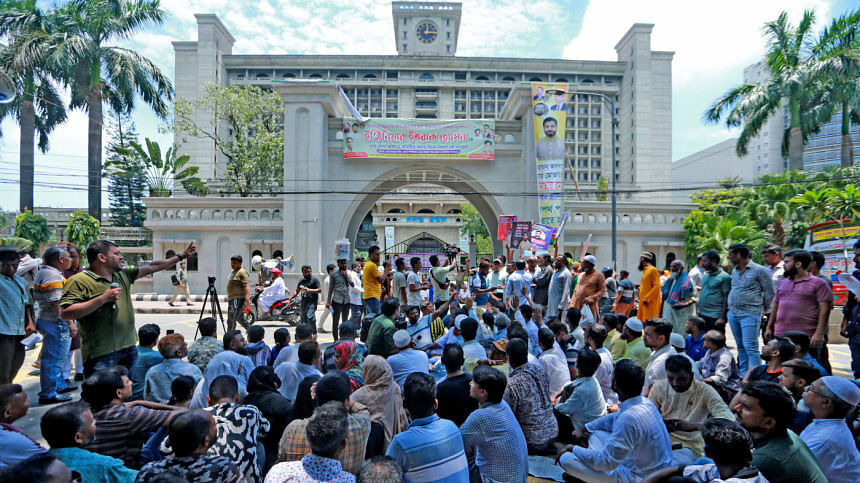How much longer must south Dhaka suffer?

For 13 consecutive days, the gates of Nagar Bhaban have remained locked, and with them, the administrative heart of Dhaka South City Corporation (DSCC) ground to a stop.
What began as a protest by supporters of BNP leader Ishraque Hossain and a faction of DSCC employees demanding Ishraque be sworn in as mayor has escalated into a full-blown standoff, paralysing the corporation and halting essential civic services to half of Dhaka.
Yet, as with other protests that have gripped Dhaka over the past months, it is the citizens who bear the brunt of the crisis. Every single day, thousands are denied vital municipal services—birth and death registrations, citizenship certificates, inheritance documentation, and land transfers.
The disruption extends beyond paperwork. It is a direct blow to livelihoods, governance, and urban functionality.
The financial toll is equally severe. With its annual revenue collection stalled, DSCC preparations for Eid-ul-Azha, just weeks away, hang in uncertainty.
Leasing cattle markets, planning waste disposal, and ensuring basic readiness—none of these critical tasks have progressed.
Yet, perhaps most puzzling is the government's apparent silence. There has been no decisive action to resolve the deadlock. No meaningful intervention, no urgency, no acknowledgment of the hardships citizens face. As the stalemate drags on, one must ask: for how long will citizens be forced to suffer as the government just watches the crisis to prolong?
At the core of this crisis lies a prolonged and reluctant implementation of a clear court ruling.
On March 27, the Election Tribunal of Dhaka overturned the 2020 DSCC election results, declared Ishraque the winner, and ordered the Election Commission to issue a gazette within 10 days.
The verdict cancelled the gazette notification that declared Sheikh Fazle Noor Taposh the winner of the DSCC polls held in February 2020.
The decision came in response to an old petition filed by Ishraque back on March 3, 2020, alleging electoral irregularities and corruption. Following the ruling, on April 27 this year, the Election Commission published a gazette declaring Ishraque the DSCC mayor and instructed the Local Government Ministry to facilitate his oath-taking.
What should have been a straightforward process, however, got entangled in political and administrative complexities.
On May 13, a DSCC resident filed the writ petition with the HC, challenging the tribunal's verdict and the EC's gazette. Frustrated by the delay, Ishraque's supporters, under the banner "Dhakabashi", began protesting in front of Nagar Bhaban the next day.
On May 15, they locked the building, completely halting all civic services.
The same day, the Local Government Division (LGD) sent a letter to the law ministry, seeking an opinion on whether any legal complications may arise from the verdict and the Election Commission's decision not to appeal it.
The law ministry did not provide an opinion as of yesterday. Then on May 22, the High Court, dealing with the writ petition, ruled unequivocally that there were no legal barriers to Ishraque's oath-taking.
In the meantime, a "leave to appeal" was filed with the Appellate Division on behalf of a citizen on Monday, challenging the High Court's dismissal order of May 22.
Today, the LGD said that it is awaiting the court's order regarding the swearing-in of Ishraque.
But legally, how much justification does this continued delay hold?
With both the Election Tribunal and the High Court having ruled in Ishraque's favour, and no legal obstacle preventing his oath-taking, the prolonged bureaucratic deadlock raises serious questions about the government's commitment to upholding judicial decisions. Is this about legal ambiguity or simply political hesitation?
The result is a deadlock that has turned a settled legal matter into a crisis of governance.
The state's institutional sluggishness and passing of responsibility has left Dhaka's citizens stranded -- without services, without answers. How long must they wait and endure as their government watches?


 For all latest news, follow The Daily Star's Google News channel.
For all latest news, follow The Daily Star's Google News channel. 



Comments